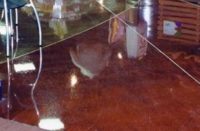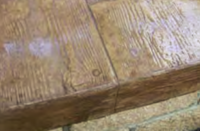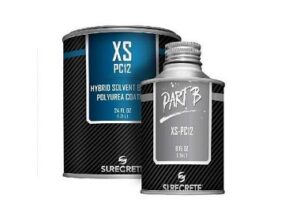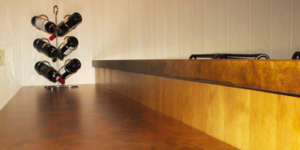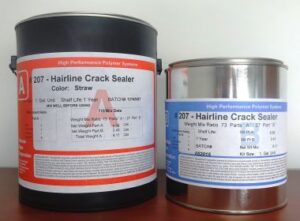
The ideal concrete countertop sealer would be a product that provides protection from stains, looks and feels like bare concrete and is safe to use.
It is nearly impossible to have both perfect aesthetics and perfect protection. But newer sealers are safer to use than those in the past.
There are three relatively new and very different types of sealers marketed specifically for concrete countertops. They represent three different philosophies and spectrums of possibilities, according to Jeff Girard, founder of the Concrete Countertop Institute in Raleigh, N.C.
First, Fu-Tung Cheng now uses a hybrid topical sealer created from a water-based acrylic. Second are hybrid lithium silicates such as Consolideck LS Guard, sold by Prosoco, and Counterguard, available through Convergent Concrete Technologies. And third, V-Seal/TARA Distribution Group Ltd. sells a water-based urethane and epoxy concrete countertop test kit consisting of O-S/W Substrate Conditioner, StoneLok E3 Epoxy and StoneLok 2K water-dilutable polyurethane. The kits can be changed to achieve maximum results.
“These are three ‘trimetrically opposed’ sealer approaches,” says Girard. “I’ve worked with all of them, and they all have very different characteristics, appearances, and workabilities.”
The Cheng sealer is a partially penetrating, thin-film application, a single-component product that is diluted with various degrees of water. Very little material is left on the surface. It is closest to a true-coating approach and is very easy to use, Girard says.
The lithium silicates are reactive coatings with a polymer component. Application is similar to the Cheng method and leaves a thin coating with a hard transparent surface.
“The difference is that the lithium silicate is a reactive process,” says Girard. “It takes a considerable amount of time to fully reach its properties. Until it does, it is potentially prone to being damaged by water and acid.” Also, he adds, lithium silicates sealers are extremely sensitive to the method used to apply them.

Lithium silicates are very new to the countertop sealer market. Girard sees them as an intermediate approach to sealing, a balance between looks and performance criteria.
The V-Seal process is closest to traditional concrete countertop sealers. It is water-based and emits little odor and few VOCs. “If someone brought us something that worked better, we would probably push that,” says Jay Tarantino, president of the TARA Group, a research and consulting group partnered with V-Seal that studies cementitious substrates and surface defects.
Girard likes the way the epoxy bonds with the concrete in the V-Seal process. “This isn’t a new product, but people have only recently been made aware that it exists,” he says.
Buddy Rhodes Concrete Products also sells a water-based acrylic sealer that isn’t new to the market, but its Satin Sealer formula has been changed to make it more user-friendly and less likely to streak, says Buddy Rhodes vice president Susan Andrews.
The new sealers stand up to stains fairly well, although the consensus is that no sealer is truly stain resistant. The key to avoiding stains, says Andrews, is to clean spills immediately, and that advice extends to the new sealers.
Are these countertop sealers really safe for food? Yes. The water-based sealers are both food-safe and easily cleaned with water. To keep the countertop clean and nontoxic, Andrews recommends using beeswax, while Lloyd recommends a food-grade carnauba wax. “There have been leaps made in the past ten years,” says Girard. “You clean up with water, there are no fumes — it is very safe to use.”
Even though these new sealers are being marketed for use on countertops, there are some varying opinions as to whether or not they can also be used to seal concrete floors. Evan Lloyd of Solid Solutions Studio in Fresno, Calif., says there is no real difference between sealers used for countertops and floors. “Concrete is concrete,” he says. “It is chemically the same on a floor or counter.”
While they might be applied differently, the sealers work pretty much the same on either surface, and durability is similar. “You have more foot traffic that wears on a floor,” says Lloyd, “but a countertop is washed more frequently.”
Andrews said to not use her company’s countertop sealer on a concrete floor — it probably isn’t as tough as what you’d need. But her company makes floor tiles sealed with the same sealer used for concrete countertops. She also said she doesn’t see a great deal of difference between countertop and other concrete sealers.
“From a sealer standpoint, there is not much difference between a concrete and floor sealer,” says Girard. “But from a performance standpoint, there’s a lot. You don’t look at individual spots on the floor. You’re more willing to overlook the flaws. The sealer is designed for periodic maintenance. Countertops are not like that. Most homeowners aren’t willing to do any maintenance, and people are very particular about the look.
“It’s the performance issue that sets sealers apart. It could be the same sealer, but people will hold them to different standards.”
The bottom line is the new sealers are like any other sealers. They are good for either looks or protection, but they aren’t perfect.
“People want the holy grail of sealers,” says Lloyd. “They want a penetrating sealer that wipes or sprays on easily, that won’t stain or scar, and that has a nice gloss. But that sealer doesn’t exist yet.”
